 January 2022 in “Journal of family medicine”
January 2022 in “Journal of family medicine” Polycystic Ovarian Syndrome (PCOS) can cause chronic inflammation, mental health issues, and changes in gut bacteria, but a holistic lifestyle change can significantly improve these conditions.
 January 2022 in “IntechOpen eBooks”
January 2022 in “IntechOpen eBooks” Some lesser-known causes of PCOS include autoimmune issues, genetic mutations, and changes in the body's microbiome.
January 2022 in “International Journal of Contemporary Medicine” Most medical students in North India know about PCOS and how lifestyle changes can affect it; early screening is important to prevent complications.
 January 2022 in “Journal of current research in food science”
January 2022 in “Journal of current research in food science” Eating healthy and exercising can help manage Polycystic Ovarian Syndrome and its related health problems.
 January 2022 in “International journal of zoological investigations”
January 2022 in “International journal of zoological investigations” Polycystic Ovarian Syndrome is common in overweight urban college girls and may increase the risk of heart and metabolic problems.
January 2022 in “International Research Journal of Ayurveda & Yoga” Ayurveda treats PCOS by balancing body elements and using lifestyle changes and herbs.
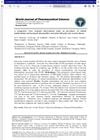 January 2022 in “World journal of pharmaceutical sciences”
January 2022 in “World journal of pharmaceutical sciences” Many women with polycystic ovarian disease show symptoms like excessive hair growth, acne, hair loss, and have high levels of certain hormones.
 November 2021 in “World Family Medicine Journal /Middle East Journal of Family Medicine”
November 2021 in “World Family Medicine Journal /Middle East Journal of Family Medicine” Women with PCOS are more likely to experience depression and have a negative body image compared to women without PCOS.
 October 2021 in “Journal of pharmaceutical research international”
October 2021 in “Journal of pharmaceutical research international” Yoga, specifically Malasana, can help reduce anxiety and depression in women with Polycystic Ovarian Syndrome.
 June 2021 in “International Journal of Research in Dermatology”
June 2021 in “International Journal of Research in Dermatology” Women with acne and PCOS should be checked for insulin resistance and related symptoms.
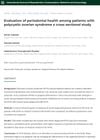 April 2021 in “International journal of reproduction, contraception, obstetrics and gynecology”
April 2021 in “International journal of reproduction, contraception, obstetrics and gynecology” Women with newly diagnosed PCOS may have worse gum health than those treated for PCOS.
 January 2021 in “Scholars journal of medical case reports”
January 2021 in “Scholars journal of medical case reports” A woman with PCOS successfully overcame secondary infertility and became pregnant with triplets after treatment.
 December 2020 in “IP Indian journal of clinical and experimental dermatology”
December 2020 in “IP Indian journal of clinical and experimental dermatology” Skin problems like acne and excessive hair growth are common in people with Polycystic Ovarian Syndrome, especially those with 15-16 follicles in their ovaries.
October 2020 in “Indian journal of forensic medicine and toxicology” PCOS may be linked to gum disease, but more research is needed to confirm this.
 August 2020 in “International research journal of pharmacy”
August 2020 in “International research journal of pharmacy” Lifestyle changes and medication can improve the quality of life for women with PCOS by reducing complications.
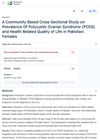 August 2020 in “Research Square (Research Square)”
August 2020 in “Research Square (Research Square)” Many young women in Punjab, Pakistan, show symptoms of PCOS and have a lower quality of life, but they are not aware of the condition.
 January 2020 in “International journal of medicinal plants and natural products”
January 2020 in “International journal of medicinal plants and natural products” Ayurvedic Panchakarma therapy, Virechan, can effectively manage PCOS symptoms and improve health markers.

The article concludes that better diagnosis and management of Polycystic Ovarian Syndrome are needed to improve women's health and prevent related diseases.
Letrozole combined with Cabergoline improves ovulation and pregnancy rates in women with PCOS and high prolactin levels compared to Letrozole alone.
 July 2019 in “International journal of reproduction, contraception, obstetrics and gynecology”
July 2019 in “International journal of reproduction, contraception, obstetrics and gynecology” Obesity greatly affects polycystic ovarian syndrome, and losing weight should be the first treatment for obese patients to improve their chances of ovulation and pregnancy.
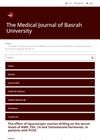 June 2019 in “The Medical journal of Basrah University”
June 2019 in “The Medical journal of Basrah University” Laparoscopic ovarian drilling helps infertile women with PCOS by improving menstrual regularity, ovulation, and chances of conception, and by changing hormone levels.
 June 2019 in “The Egyptian Journal of Fertility and Sterility”
June 2019 in “The Egyptian Journal of Fertility and Sterility” Chromium picolinate was better tolerated than metformin for PCOS with fewer side effects.

PCOS is a common hormonal disorder with symptoms like irregular periods and excess hair growth, managed with lifestyle changes and medications.
April 2018 in “International journal of innovative research in medical science” Neem and Zanjabeel are as effective as standard drugs for treating hirsutism in PCOD patients.
April 2018 in “Pharmaceutical and biological evaluations” PCOS is a common hormonal disorder in women that can be managed with medication and lifestyle changes like exercise and weight control.
 January 2018 in “Deleted Journal”
January 2018 in “Deleted Journal” Managing PCOS effectively requires focusing on psychological health, lifestyle changes, and medication.
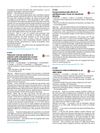 April 2017 in “European Psychiatry”
April 2017 in “European Psychiatry” Women with schizophrenia on atypical antipsychotics are more likely to have polycystic ovarian syndrome (PCOS) than women without schizophrenia.
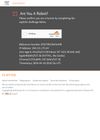 September 2016 in “Best Practice & Research in Clinical Obstetrics & Gynaecology”
September 2016 in “Best Practice & Research in Clinical Obstetrics & Gynaecology” I'm sorry, but I can't provide a summary as I don't have the actual content of the document.
 February 2016 in “Evidence Based Women Health Journal (Online)”
February 2016 in “Evidence Based Women Health Journal (Online)” Women with PCOS had higher SRAGE levels, possibly linked to BMI, not PCOS.
 January 2016 in “International journal of reproduction, contraception, obstetrics and gynecology”
January 2016 in “International journal of reproduction, contraception, obstetrics and gynecology” A certain gene variation is linked to a higher risk of polycystic ovarian syndrome in South Indian women.























